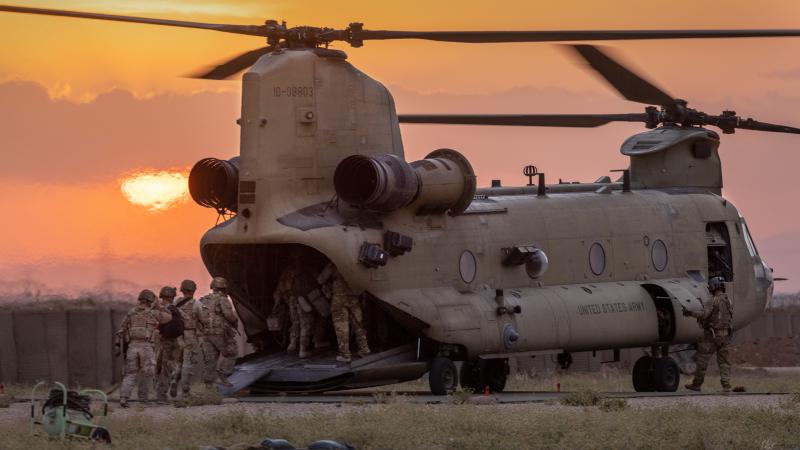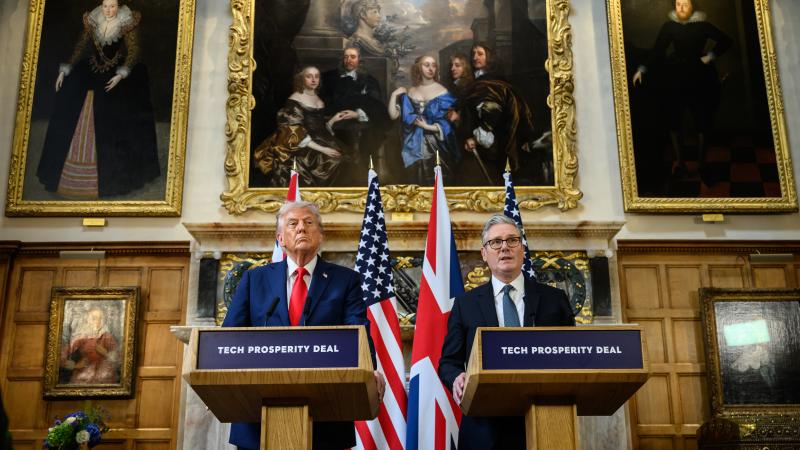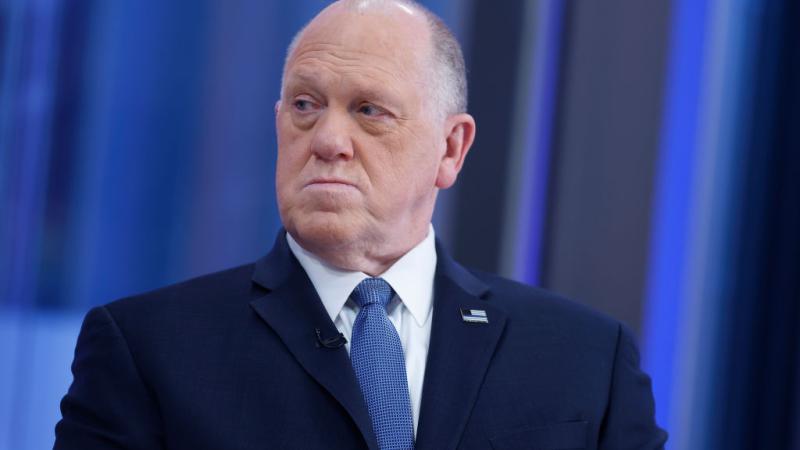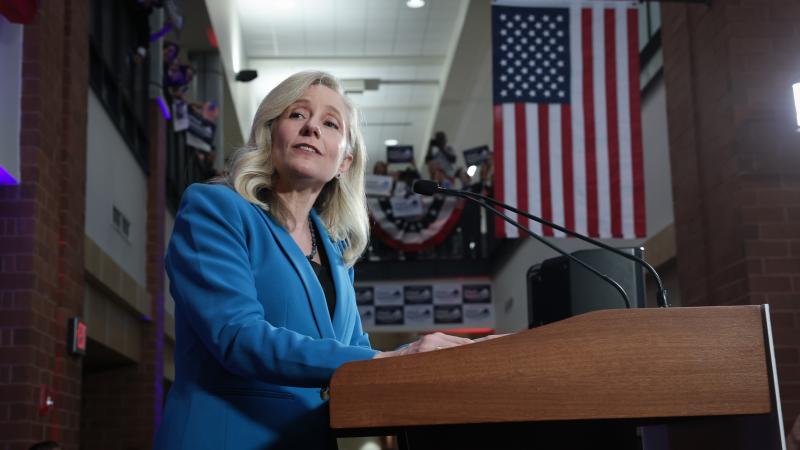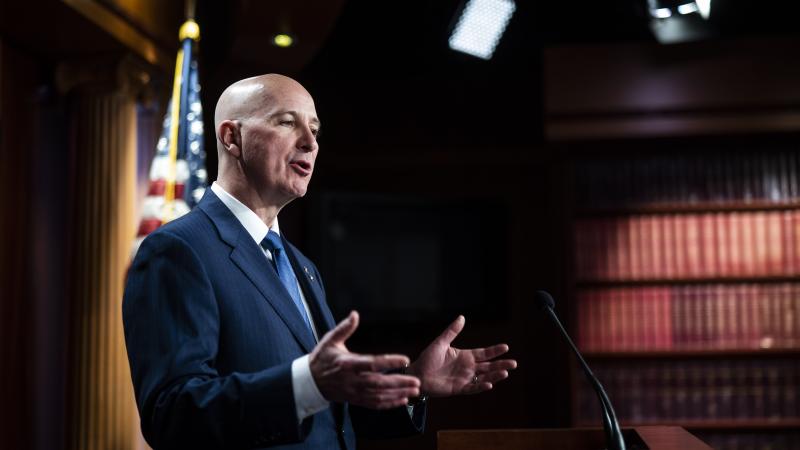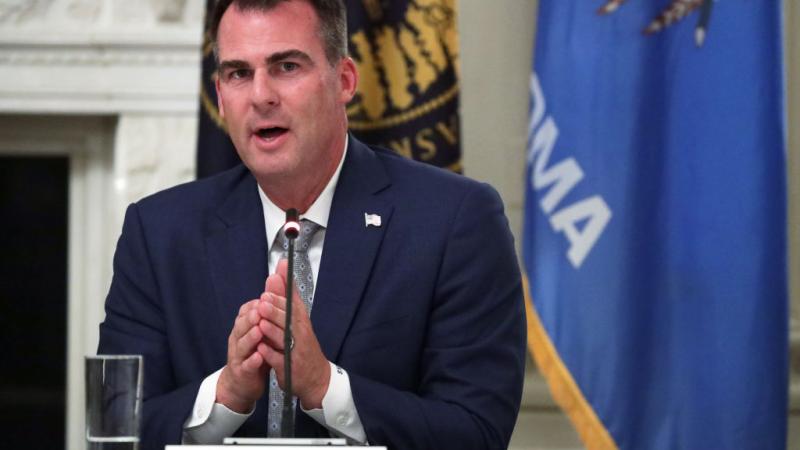Khashoggi's ties to extremists face new attention as D.C. renames street after him
Biden under fire for planning to visit Saudi Arabia next month, with critics resurfacing story of slain dissident.
A day after the White House announced President Biden will visit Saudi Arabia next month, the street in front of the Saudi embassy in Washington, D.C. was renamed for Jamal Khashoggi, the slain Saudi dissident who was a columnist for the Washington Post.
Supporters hailed Wednesday's unveiling of a street sign reading "Jamal Khashoggi Way" to honor a man described as a champion of freedom and democracy, echoing the praise heaped on Khashoggi by political elites and mainstream media outlets following his 2018 death.
The ceremonial designation for the block that houses the Saudi embassy will serve as "a constant reminder, a memorial to Jamal Khashoggi's memory that cannot be covered up," said Phil Mendelson, chairman of the D.C. Council, which voted unanimously for the name change.
Saudi Crown Prince Mohammed bin Salman approved an operation that resulted in Khashoggi's murder at the Saudi consulate in Istanbul, Turkey, according to a U.S. intelligence assessment released last year.
On Thursday, White House Press Secretary Karine Jean-Pierre said Biden agrees with the conclusion of that assessment.
"Through his journalism, Jamal Khashoggi was a fierce advocate for democracy, human rights, and the rule of law," said D.C. Council member Brooke Pinto, who introduced the bill to rename the street.
"He knew that by shining a light on Saudi Arabia and seeking truth, he risked his freedom and indeed his life … everyone who visits the embassy in Washington, D.C. will be reminded of Mr. Khashoggi’s courage, and the indispensable values of free speech and a free and independent press."
Beyond the image of a martyred journalist who died defending democratic values, however, critics argue there is another side to Khashoggi's story that has received less attention — one that reveals a political operative who rubbed elbows with extremists and held anti-Western views.
This full picture, according to experts who spoke to Just the News, raises questions about the decision to honor Khashoggi with a street sign in the nation's capital.
Putting a man who wrote and spoke "glowingly" of Osama bin Laden "on the same level as some of the men and women who have founded and served the United States is a particularly embarrassing travesty," said Kyle Shideler, director for homeland security and counterterrorism at the Center for Security Policy.
Shideler was alluding to the fact that Khashoggi was a close friend of bin Laden, and said that he cried when the al Qaeda leader was confirmed dead in May 2011.
"I just fell apart crying heartbreak to you, Abu Abdullah," Khashoggi tweeted in Arabic hours after the U.S. raid that killed bin Laden, referring to him by his nom de guerre when fighting the Soviets in Afghanistan in the 1980s.
"You were beautiful, brave in those beautiful days in Afghanistan before you succumbed to anger and passion."
Khashoggi grew close to bin Laden while covering the war between the mujahedeen and the Soviet Union for Saudi media. He spent several nights sleeping alongside bin Laden in his camps and in caves.
"He had a sentiment of Muslims, a concept of jihad, and of being close to God," Khashoggi said in a 2005 interview.
The two kept a connection for years after the Afghanistan war but grew apart as bin Laden built up Al-Qaeda and embraced terrorism. However, Khashoggi continued to have a "soft spot" for bin Laden, even after the 9/11 terrorist attacks, according to Nawaf Obaid, a Saudi academic and former Khashoggi colleague.
"I would say he was ideologically -- and I would even go as far as theologically -- conflicted by him," Obaid said of bin Laden's effect on Khashoggi.
As a young man in the 1970s, Khashoggi joined the Muslim Brotherhood, which analysts describe as an Islamist group that seeks to rid the Islamic world of Western influence.
Khashoggi defended the Brotherhood through his media platforms right up to his death and promoted Yusuf al-Qaradawi, a spiritual leader of the transnational organization, as an example of a scholar who should be credited for introducing the term "moderate Islam."
Qaradawi previously said Muslims who are killed fighting U.S. soldiers in Iraq are martyrs and called the Holocaust a "punishment" for Jews, expressing hope for Muslims to carry out another such genocidal campaign in the future.
Khashoggi sent out several antisemitic tweets in the years before his death and often expressed support for an armed "struggle" against Israel.
Such Islamist views are not necessarily at odds with Khashoggi's purported promotion of freedom and democracy, according to experts.
"When an Islamist says democracy, they don't mean liberal democracy," said David Reaboi, a fellow at the Claremont Institute. "The same with freedom. For example, freedom means freedom from the laws of man and an embrace of the laws of God, or sharia [Islamic law]."
While Khashoggi appeared to maintain some level of allegiance to the Muslim Brotherhood throughout his life, his national allegiance changed when bin Salman rose to power in Saudi Arabia.
For years, Khashoggi was a regime insider who was close to elements of the Saudi royal family as he rose up the media ranks in Saudi Arabia. He was selected to be longtime Saudi intelligence chief Prince Turki bin Faisal's adviser and media spokesman when bin Faisal became ambassador to London and then Washington from 2003 to 2006.
However, Khashoggi later left Saudi Arabia in 2017 for the U.S. and went into self-imposed exile. Reaboi said Khashoggi "seemed to fall out of favor with the Saudi government" as bin Salman, an anti-Islamist who wanted to impose sweeping reforms and stamp out the Muslim Brotherhood, ascended to power.
Amid bin Salman's modernization push, Khashoggi advocated that Saudi Arabia return to its "proper religious roots," referring to the country approvingly as the "mother and father of political Islam."
During this time, Khashoggi became a Washington Post columnist and, according to Shideler and Reaboi, an asset of Qatar, a regional rival of Saudi Arabia and supporter of the Muslim Brotherhood.
"Khashoggi was an active part of a Qatari information operation," said Reaboi. "Qatar used the Washington Post as a way to launder their political warfare priorities using a prominent and legitimate media outlet."
The Washington Post itself reported in December 2018, two months after Khashoggi's death, that the murdered writer may have been pushing anti-Saudi propaganda on behalf of Qatar.
"Text messages between Khashoggi and an executive at Qatar Foundation International [a state-led nonprofit] show that the executive, Maggie Mitchell Salem, at times shaped the columns he submitted to the Washington Post, proposing topics, drafting material and prodding him to take a harder line against the Saudi government," according to the Post.
"It is far better to understand Khashoggi as an agent of foreign influence and pawn in intelligence operations than as either a journalist and democracy advocate," said Shideler.
"That the D.C. government has allowed itself to be used as a tool by these very same lobbies and forces betrays a lack of seriousness from people who are supposed to be career politicians."
This is hardly the only example of Qatari influence on U.S. soil stirring controversy. Earlier this month, Richard Olson, a former U.S. ambassador to Pakistan and the United Arab Emirates, pleaded guilty to illegal lobbying on behalf of Qatar. Days later, the FBI seized documents from retired Marine Gen. John Allen, who commanded NATO troops in Afghanistan and who authorities now say made false statements and withheld "incriminating" documents about his role in an illegal foreign lobbying campaign on behalf of Qatar.
Critics of Saudi Arabia recalled the grisly details of Khashoggi's death this past week to denounce Biden's decision to visit the kingdom. Khashoggi's fiancee was one such voice.
Biden had famously promised to make Saudi Arabia an international "pariah" on the campaign trail in 2020 but appears to have somewhat pivoted. The president is expected to discuss oil production with the Saudis in hopes of helping drive down record gas prices, among other issues.
"We will hold the Biden administration to account for its treacherous betrayal of the promises it made to the American people, the promises the America people wanted to hear, which is to end support for the brutal dictatorship of Saudi Arabia," said Sarah Leah Whitson, executive director of Democracy for the Arab World Now (DAWN), at Wednesday's unveiling ceremony.
Khashoggi founded DAWN, which has a network of Islamist links.
Reaboi said the D.C. government's decision to honor Khashoggi was a "virtue signal".
"It's a slap in the face because it signals the victory of the Qatari information operation that engulfed not only the media but the political class and many of the think-tanks in town."
The D.C. Council didn't respond to a request for comment on Khashoggi's controversial past.


